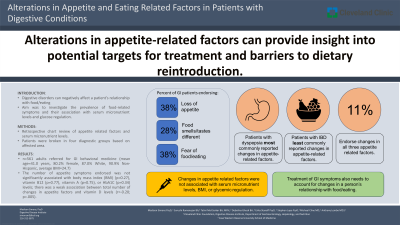Sunday Poster Session
Category: Functional Bowel Disease
P0620 - Alterations in Appetite and Eating-Related Factors in Patients With Digestive Conditions
Sunday, October 27, 2024
3:30 PM - 7:00 PM ET
Location: Exhibit Hall E

Has Audio

Madison Simons, PhD
Cleveland Clinic
Cleveland, OH
Presenting Author(s)
Madison Simons, PhD1, Suruchi Ramanujan, MD2, Tatini Mal-Sarkar, MPH3, Debolina Ghosh, BA3, Stephen Lupe, 1, Erika Staneff, 1, Michael Cline, DO4, Anthony J. Lembo, MD5
1Cleveland Clinic, Cleveland, OH; 2University of California San Diego, Cleveland, OH; 3Case Western Reserve University School of Medicine, Cleveland, OH; 4Cleveland Clinic Foundation, Cleveland, OH; 5Digestive Disease Institute, Cleveland Clinic, Cleveland, OH
Introduction: Digestive disorders can negatively affect a patient’s relationship with food/eating including diminished appetite, changes in the way food tastes/smells, and experiencing fear around eating. In this study, we sought to investigate the prevalence of these food-related symptoms and their association with serum micronutrient levels and glucose regulation.
Methods: Adult patients referred for GI behavioral medicine evaluation were evaluated for changes in appetite related factors due to digestive symptoms. Serum micronutrient levels were retrieved from the electronic medical record. Descriptive statistics assessed the incidence of these symptoms within this population. Spearman’s rank correlation coefficient assessed the relationship between appetite related factors and serum micronutrient levels. Patients were broken in four diagnostic groups: esophagus, dyspepsia, inflammatory bowel disease (IBD), and irritable bowel syndrome (IBS).
Results: A total of 561 patients were included in the study (mean age=41.0 years, 80.2% female, 87.0% White, 90.9% Non-Hispanic, average BMI=24.7). Approximately, 38% of patients reported a loss of appetite due to their digestive symptoms, while 28.2% reported changes in the taste and smell of food. Additionally, 37.7% reported fear around eating due to their digestive symptoms. Over 10% of patients experienced all three symptoms around the eating experience. Patients with dyspeptic symptoms were most likely to report changes in appetite-related factors, while patients with inflammatory bowel disease (IBD) were the least likely to report these symptoms. The number of appetite symptoms endorsed was not significantly associated with body mass index (BMI) (p=0.27), vitamin B12 (p=0.77), vitamin A (p=0.75), or HbA1C (p=0.34) levels; there was a weak association between total number of changes in appetite factors and vitamin D levels (r=-0.20; p=.005).
Discussion: Food related symptoms are common in patients referred for GI behavioral medicine, particularly in patients with dyspepsia, and were not associated with abnormalities in serum micronutrients other than Vitamin D. Alterations in appetite-related factors can provide insight into potential targets for treatment and barriers to dietary reintroduction.
Note: The table for this abstract can be viewed in the ePoster Gallery section of the ACG 2024 ePoster Site or in The American Journal of Gastroenterology's abstract supplement issue, both of which will be available starting October 27, 2024.
Disclosures:
Madison Simons, PhD1, Suruchi Ramanujan, MD2, Tatini Mal-Sarkar, MPH3, Debolina Ghosh, BA3, Stephen Lupe, 1, Erika Staneff, 1, Michael Cline, DO4, Anthony J. Lembo, MD5. P0620 - Alterations in Appetite and Eating-Related Factors in Patients With Digestive Conditions, ACG 2024 Annual Scientific Meeting Abstracts. Philadelphia, PA: American College of Gastroenterology.
1Cleveland Clinic, Cleveland, OH; 2University of California San Diego, Cleveland, OH; 3Case Western Reserve University School of Medicine, Cleveland, OH; 4Cleveland Clinic Foundation, Cleveland, OH; 5Digestive Disease Institute, Cleveland Clinic, Cleveland, OH
Introduction: Digestive disorders can negatively affect a patient’s relationship with food/eating including diminished appetite, changes in the way food tastes/smells, and experiencing fear around eating. In this study, we sought to investigate the prevalence of these food-related symptoms and their association with serum micronutrient levels and glucose regulation.
Methods: Adult patients referred for GI behavioral medicine evaluation were evaluated for changes in appetite related factors due to digestive symptoms. Serum micronutrient levels were retrieved from the electronic medical record. Descriptive statistics assessed the incidence of these symptoms within this population. Spearman’s rank correlation coefficient assessed the relationship between appetite related factors and serum micronutrient levels. Patients were broken in four diagnostic groups: esophagus, dyspepsia, inflammatory bowel disease (IBD), and irritable bowel syndrome (IBS).
Results: A total of 561 patients were included in the study (mean age=41.0 years, 80.2% female, 87.0% White, 90.9% Non-Hispanic, average BMI=24.7). Approximately, 38% of patients reported a loss of appetite due to their digestive symptoms, while 28.2% reported changes in the taste and smell of food. Additionally, 37.7% reported fear around eating due to their digestive symptoms. Over 10% of patients experienced all three symptoms around the eating experience. Patients with dyspeptic symptoms were most likely to report changes in appetite-related factors, while patients with inflammatory bowel disease (IBD) were the least likely to report these symptoms. The number of appetite symptoms endorsed was not significantly associated with body mass index (BMI) (p=0.27), vitamin B12 (p=0.77), vitamin A (p=0.75), or HbA1C (p=0.34) levels; there was a weak association between total number of changes in appetite factors and vitamin D levels (r=-0.20; p=.005).
Discussion: Food related symptoms are common in patients referred for GI behavioral medicine, particularly in patients with dyspepsia, and were not associated with abnormalities in serum micronutrients other than Vitamin D. Alterations in appetite-related factors can provide insight into potential targets for treatment and barriers to dietary reintroduction.
Note: The table for this abstract can be viewed in the ePoster Gallery section of the ACG 2024 ePoster Site or in The American Journal of Gastroenterology's abstract supplement issue, both of which will be available starting October 27, 2024.
Disclosures:
Madison Simons indicated no relevant financial relationships.
Suruchi Ramanujan indicated no relevant financial relationships.
Tatini Mal-Sarkar indicated no relevant financial relationships.
Debolina Ghosh indicated no relevant financial relationships.
Stephen Lupe: Ayble Health – Consultant.
Erika Staneff indicated no relevant financial relationships.
Michael Cline indicated no relevant financial relationships.
Anthony Lembo: Allurion – Stock Options. Bristol Myers Squibb – Stock Options. Johnson & Johnson – Stock Options. Vibrant Advisory Board – Advisory Committee/Board Member.
Madison Simons, PhD1, Suruchi Ramanujan, MD2, Tatini Mal-Sarkar, MPH3, Debolina Ghosh, BA3, Stephen Lupe, 1, Erika Staneff, 1, Michael Cline, DO4, Anthony J. Lembo, MD5. P0620 - Alterations in Appetite and Eating-Related Factors in Patients With Digestive Conditions, ACG 2024 Annual Scientific Meeting Abstracts. Philadelphia, PA: American College of Gastroenterology.
